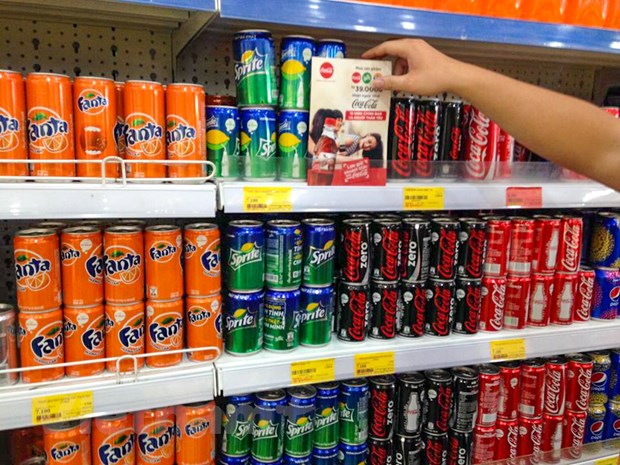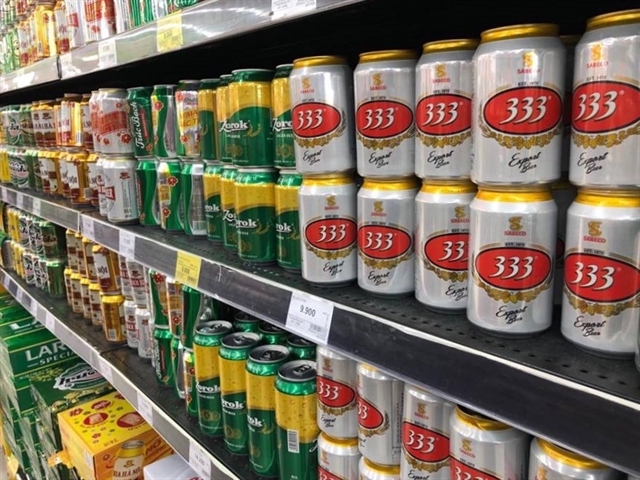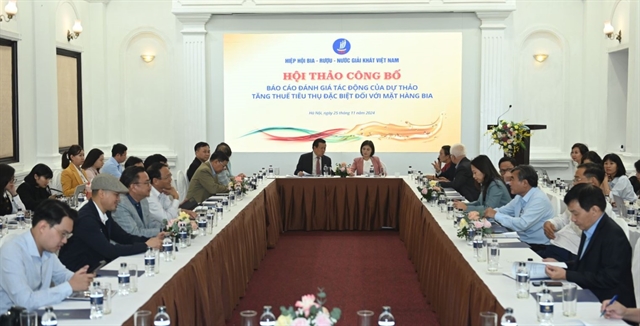 Economy
Economy

 |
| Beer on display at a supermarket. The revised Excise Tax Law aims to increase excise tax rates for alcohol, sugary drinks, and tobacco products. — Photo baotintuc.vn |
HÀ NỘI — An impact assessment study of the Ministry of Finance’s draft proposal to increase the special consumption (excise) tax on beer was released recently.
A meeting was held in Hà Nội on Monday to discuss the study, featuring experts that conducted the assessment from the Vietnam Institute of Strategy and Policy for Industry and Trade, the Vietnam Beverage Research Institute, the Central Institute for Economic Management, and the General Statistics Office.
The study evaluates the impact of increasing the excise tax on beer on the economy, based on scenarios 1 and 2 in the revised draft Excise Tax Law suggested by the Ministry of Finance, and Scenario 3 proposed by the Vietnam Beer, Alcohol, and Beverage Association.
The draft law was written by a drafting agency under the Ministry of Finance.
Assessment from the independent experts pointed out that the draft law lacks specific quantitative data, despite having outlined briefly some qualitative impacts of the tax increase on businesses, society and the healthcare system.
A representative from the research group said: “The drafting agency has provided a short quantitative assessment, which only measures how tax increases will boost State revenue through a simplified method, without considering the relation between the beer industry and the entire economy. Therefore, their proposal is not comprehensive and not scientifically grounded in the macroeconomic context.”
According to the proposal, the three goals of increasing excise tax are to reduce beer consumption rates, align with international practices, and contribute to ensuring State budget revenue.
The independent experts argued that the third goal would not be achieved when considering the overall revenue sources in all three proposed scenarios.
Their calculations show that under all scenarios, increasing excise tax on beer would increase indirect taxes on products and services, but would not compensate for the significant reduction in direct taxes on corporate income and personal income.
This would reduce the added value of the beer industry, the economy, and workers' income, leading to a sharp decline in GDP and GDP growth. Specifically, Scenario 2 would cause cumulative GDP to drop by about VNĐ32.5 trillion (US$1.3 billion) between 2026 and 2030, measured with constant prices.
 |
| A meeting was held in Hà Nội on Monday to discuss the impact assessment study of the revised Excise Tax Law, with the participation of independent experts. — Photo baotintuc.vn |
Regarding the goal of reducing beer consumption, experts suggested that the drafting agency should clarify how much consumption would be reduced, by determining the price elasticity of beer demand and identifying changes in beer and alcohol consumption patterns, rather than relying on subjective assessments.
Speaking about the assessment, Dr Nguyễn Quốc Việt, deputy director of the Vietnam Institute for Economic and Policy Research, said that it highlights a key principle in tax law-making: sustainability of revenue sources must be ensured.
“Sustainable revenue primarily comes from direct taxes on corporate and personal incomes, rather than consumption taxes,” he said.
“The study has shown that increasing excise tax on beer under the Ministry of Finance's proposals would lead to a sharp decline in direct taxes.”
Increasing tax is only one of the measures to reduce beer and alcohol consumption, he said, adding: “We need to use and integrate multiple measures and guide people towards responsible consumption.
“Beer producers, consumer protection associations, and Government agencies must provide detailed recommendations on the content and level of beer consumption that is beneficial or harmful to health.”
Nguyễn Thị Cúc, chair of the Vietnam Tax Consultants Association (VTCA), said that expecting tax increases to reduce alcohol consumption is unrealistic since consumer habits are difficult to change.
She pointed out that in many countries, including Việt Nam, beer consumption is seen as part of the culture and a form of refreshment.
“Many countries even develop beer products to promote tourism. If tax is increased, high-earners will continue paying, while lower-income individuals may turn to cheaper products from informal markets,” she said.
“So to reduce alcohol consumption, we need multiple solutions, not just increasing tax.” — VNS




